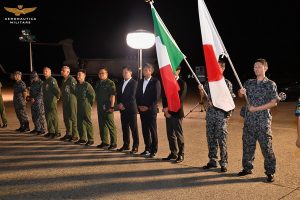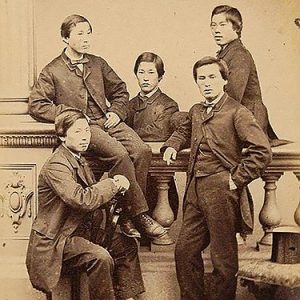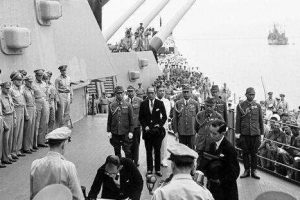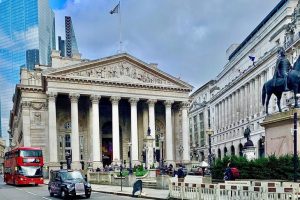In late June, the Emperor visited the UK as a state guest. The Japanese media generally offered vague praise, saying that the visit was for international goodwill at the invitation of the King of England the imperial and royal families of Japan and the UK regard each other as special, and that this visit has further deepened the friendly relations between the two countries. However, when we look at Japan-UK relations over a span of 160 years since the end of the Edo period and the Meiji Restoration, the Emperor's visit to the UK this time indicates that the US and UK's management of Japan as the leaders of the North Atlantic Treaty Organization (NATO) has reached a new stage. As Pax Americana, which succeeded Pax Britannica from the 19th century to the early 20th century, reaches a deadlock, the UK, which has left the European Union (EU), is once again calling for "Global Britain" and has begun to confront emerging powers, centered around China and Russia, by strengthening the Anglo-Saxon alliance between the US and the UK. In order to win this new global struggle for hegemony, the United States and Britain strengthened the military power of Japan, which continues to be listed as an enemy in the UN Charter, and made it into an "ally." They exploited the overwhelming Anglo-Saxon worship that is widespread among the Japanese people through exchanges with the Imperial Family and the Royal Family .
The Anglo-Japanese relationship is one of the main themes of this blog, and I have continued to raise the issue, starting with articles such as " Britain moves to revive the Anglo-Japanese Alliance, managing Japan while encircling China", " Britain to significantly expand military forces in cold war with China, US-UK-Japan military cooperation advances", and " 'Putting a yoke on Japan's right-wing government' - the new Anglo-Japanese Alliance and expanded NATO", right up to my more recent article, " The main enemy is not China, but Japan - the fictitious US-Japan alliance" .
■ A British newspaper report that hits the nail on the head
According to information from the UK, ahead of the Emperor's visit, the online edition of the British tabloid Daily Express reported on the background to the Emperor's visit, saying, "It is King Charles' strong wish. Experts say that 'Japan is an important country for the UK in terms of economy and defense,' and Japan and the UK have a relationship of mutual support." Unlike the Japanese media's empty reports of praise for the Imperial Family wrapped in beautiful words , the British media, which take the stance that "the Royal Family should serve the people," were right on the mark when they pointed out that "Japan was invited as a state guest because today Japan is an extremely important country in terms of economy and defense."
The Emperor arrived in London on the afternoon of June 22nd local time and stayed in the UK as a state guest for three days from the 25th, attending a welcoming ceremony and a welcome dinner at Buckingham Palace on the same day. As if to coincide with this, on June 25th (Japan time), the Japan Air Self-Defense Force announced that it would conduct joint training with the French, German, and Spanish air forces, which are currently conducting the joint exercise "Pacific Skies 24" in the Indo-Pacific region, from July 19th, mainly at Chitose Base in Hokkaido, in order to strengthen cooperation with the North Atlantic Treaty Organization (NATO). In response, Russia, which has just concluded a military agreement with North Korea, strongly opposed this, saying, " The irresponsible policy of the Kishida administration in supporting Ukraine will increase tensions in Northeast Asia and the entire Asia-Pacific region. We will take appropriate countermeasures." The Japanese government, which has only followed the lead of the US, UK, and NATO, has further increased military tensions in Northeast , and the lives of the Japanese people have been strained by the embargo and the rise in resource prices due to NATO's sanctions against Russia backfiring.
 The UK, which can be said to be the creator of NATO, was one of the first European NATO member countries to sign the Acquisition and Cross-Servicing Agreement (ACSA) for joint military exercises with the Self-Defense Forces in 2018. With a view to countering the Chinese military in the South China Sea , the UK has strengthened military cooperation with Japan on land, sea and air, such as by dispatching the state-of-the-art aircraft carrier "Queen Elizabeth II" to the Western Pacific. Following the UK, France and Germany will be Italy, which will hold its first joint air force exercise with the Japan Air Self-Defense Force in August 2023 based at Komatsu Air Base in Ishikawa Prefecture (photo). Spain will participate for the first time this time. The Japanese and British governments have agreed in principle to conclude a "Joint Training Facilitation Agreement" that will eliminate the need for inspections when troops from both countries enter each other's countries, and some Japanese media are excited that the alliance will be revived in 2023 , the 100th anniversary of the expiration of the Anglo-Japanese Alliance. The invitation of the Emperor as a state guest this time can be seen as a celebration of this "new Anglo-Japanese Alliance." There is no doubt that the British royal family acted at the request of financial capital in the City of London and Wall Street, as well as the British and American governments.
The UK, which can be said to be the creator of NATO, was one of the first European NATO member countries to sign the Acquisition and Cross-Servicing Agreement (ACSA) for joint military exercises with the Self-Defense Forces in 2018. With a view to countering the Chinese military in the South China Sea , the UK has strengthened military cooperation with Japan on land, sea and air, such as by dispatching the state-of-the-art aircraft carrier "Queen Elizabeth II" to the Western Pacific. Following the UK, France and Germany will be Italy, which will hold its first joint air force exercise with the Japan Air Self-Defense Force in August 2023 based at Komatsu Air Base in Ishikawa Prefecture (photo). Spain will participate for the first time this time. The Japanese and British governments have agreed in principle to conclude a "Joint Training Facilitation Agreement" that will eliminate the need for inspections when troops from both countries enter each other's countries, and some Japanese media are excited that the alliance will be revived in 2023 , the 100th anniversary of the expiration of the Anglo-Japanese Alliance. The invitation of the Emperor as a state guest this time can be seen as a celebration of this "new Anglo-Japanese Alliance." There is no doubt that the British royal family acted at the request of financial capital in the City of London and Wall Street, as well as the British and American governments.
■ Prime Minister Kishida's pledge is sugarcoated
Following the Buckingham Palace on the 25th, a dinner was held on the 26th in the world's financial center, the City of London, where people from the financial district gathered to welcome the Emperor's visit to the UK. In fact, Prime Minister Kishida Fumio had stopped by the Guildhall, the City of London's city hall, where the banquet was held, when he visited the UK in January 2022, and called for "Invest in Kishida." Prime Minister Kishida himself described his "new capitalism" as "an upgrade of capitalism." He called for the effective use of the private sector with four pillars: "investment in people," "investment in science, technology and innovation," "investment in startups," and "investment in green and digital," and promised to formulate a "grand design for new capitalism and its implementation plan" in June .
In September of the same year , he unveiled his " Kishida 's New Capitalism " concept in New York , the capitalist ... The new plan is to create an ideal investment environment for foreign capital by promoting an unprecedented depreciation of the yen and a strong dollar, and to accelerate the "selling of Japan." The Emperor's visit to the City was the final step in the plan, and was a sugar coat to wrap it up.
 ■ Controlling Japan since the end of the Edo period and the Meiji Restoration, a twisted relationship continues
■ Controlling Japan since the end of the Edo period and the Meiji Restoration, a twisted relationship continues
Among the many photographs hanging on the walls of the dining room of Glover House in Nagasaki, the one of the Choshu Five (photo) is particularly eye-catching. The five Choshu samurai -- Inoue Monda ( Kaoru ) , Endo Kinsuke , Yamao Yozo , Ito Shunsuke ( Hirobumi) (photo top right) and Nomura Yakichi ( Inoue Masaru) -- are known as the Choshu Five and were sent to Britain by the Choshu Domain via China in 1863 to study at University College London and other institutions. The five were arranged for to travel to Britain by Abel Gower, the British consul in Japan, William Keswick of Jardine Matheson & Co., and arms dealer Thomas Glover of Glover & Co., the Nagasaki branch of Jardine Matheson & Co., and were looked after by Hugh Matheson, president of Matheson Trading Co., during their studies in Britain .
The Choshu clan, whose successive lords were the Mori clan , one of the Five Elders in the Toyotomi administration , is said to have secretly harbored the desire to overthrow the shogunate and the Tokugawa regime throughout the Edo period; Britain, seeing through this, supported and nurtured the Choshu clan, along with the Satsuma clan, as a key force in overthrowing the shogunate and building a new Meiji regime. From this perspective, the Meiji Restoration can be considered a military coup within the samurai class itself. The idea that Sakamoto Ryoma was the main player in the Satsuma-Choshu Alliance was a way for Japanese authors to make their novels more interesting. In fact, it is reasonable to see it as having been led by Britain, and this makes sense.
After the deaths of the three great men of the Meiji Restoration, Kido Takayoshi, Saigo Takamori, and Okubo Toshimichi, Ito Hirobumi, along with Okuma Shigenobu, Itagaki Taisuke, and Inoue Kaoru, cooperated with the United Kingdom and the United States as a second-generation leader , promoting industrial modernization ( enriching the country ) and militarization ( strengthening the military ). The United Kingdom, whose biggest geopolitical issue was preventing Russian expansion in eastern Eurasia, used the City as a source of funding for Japan, helping it get through the Sino-Japanese War and the Russo-Japanese War. It can be said that the enlightenment without a civil revolution and the absolute monarchy of the Emperor, who was granted great powers through the establishment of a constitution in name only, were also produced by the United Kingdom. After the Russo-Japanese War, relations with the United States rapidly deteriorated over the interests in Manchuria, and the Anglo-Japanese Alliance was dissolved due to American opposition. After that, the supreme command authority stipulated in the Meiji Constitution became a loophole, and the military, which claimed independence from the supreme command authority, continued to invade China without restraint, and Japan entered into a war against the United States and Britain (1941-1945).
Modern Japan began as a semi-colony of the United Kingdom, with unequal treaties. The twisted relationship between Japan and the UK prevents the monarchs of the two countries from making mutual visits. Since the war, the Emperor has visited the UK six times, while the King (Queen) of England has only visited Japan once. It can be said that this is a twisted relationship in which the Japanese Imperial Family cozys up to the British Royal Family. It is very similar to the tributary system, the international order formed by successive Chinese dynasties and the surrounding countries and peoples in East Asia up until the modern era . The UK's true intention is probably that of a "suede state" and a "tributary state."
■ "The Neutralization of Japan" - The Core of the Potsdam Declaration
 Following Japan's surrender in August 1945 by accepting the Potsdam Declaration, the most important issue for the United States and the United Kingdom, which occupied Japan militarily, was the sentence in the draft recommendation for surrender to Japan, " Japan will be rendered powerless so that it cannot again start or support a war." The declaration states, " Until we can be certain that Japan's war-making capability has been destroyed, the occupation of Japan will continue." Although the 1947 Constitution proclaimed the renunciation of war and rendered Japan powerless, today, nearly 80 years later, Japan's defense budget will rise to the third largest in the world by 2027 in a simple comparison. The Self-Defense Forces, a military organization, will be incorporated into the NATO collective security system led by the United States and the United Kingdom, and Japan will be managed by the United States and the United Kingdom, and will never be allowed to become independent. This is the essence of the new security legislation of 2015, which was enacted in 2014 with the approval of the exercise of the right of collective self-defense. In addition to the Japan-US Security Treaty, Japan's de facto membership in NATO has placed the Self-Defense Forces in a double "pin-cap" situation, rendering them "powerless" against the US and Britain.
Following Japan's surrender in August 1945 by accepting the Potsdam Declaration, the most important issue for the United States and the United Kingdom, which occupied Japan militarily, was the sentence in the draft recommendation for surrender to Japan, " Japan will be rendered powerless so that it cannot again start or support a war." The declaration states, " Until we can be certain that Japan's war-making capability has been destroyed, the occupation of Japan will continue." Although the 1947 Constitution proclaimed the renunciation of war and rendered Japan powerless, today, nearly 80 years later, Japan's defense budget will rise to the third largest in the world by 2027 in a simple comparison. The Self-Defense Forces, a military organization, will be incorporated into the NATO collective security system led by the United States and the United Kingdom, and Japan will be managed by the United States and the United Kingdom, and will never be allowed to become independent. This is the essence of the new security legislation of 2015, which was enacted in 2014 with the approval of the exercise of the right of collective self-defense. In addition to the Japan-US Security Treaty, Japan's de facto membership in NATO has placed the Self-Defense Forces in a double "pin-cap" situation, rendering them "powerless" against the US and Britain.
Henry Kissinger (then National Security Advisor to the President of the Nixon administration), who went to Beijing as a secret envoy in 1971, regretted making Japan an economic superpower, telling Zhou Enlai (then Premier of the State Council) that he had made a mistake. The victory in the Russo-Japanese War and entry into World War I meant joining the ranks of the five great powers. This was the first success story of the Imperial Empire, a state with sovereignty over Japan. After being reduced to ashes by defeat in World War II, Japan sent out a succession of corporate warriors, and 40 years later, in the late 1980s, Japan money flooded the world, buying up the wealth of the United States and Europe, creating a second success story as an economic superpower. Kissinger's regret became a permanent anti-Japanese retaliation that began in the 1990s. Taking advantage of the right-wing influence of the Abe Nippon Kaigi administration, which admired Japan as a military superpower amid Japan's decline, he planned to approve the exercise of collective self-defense rights by the Self-Defense Forces and double defense spending. As nationalist right-wing forces, including those around Abe, move toward independence from the United States, the murder of former Prime Minister Shinzo Abe and the dissolution of the Abe faction in the Liberal Democratic Party occurred. Against this backdrop, the Kishida administration, a descendant of the Yoshida Shigeru cabinet that unhesitantly accepted US and British management of Japan, is struggling with an extremely low approval rating and is searching for a way to survive.
■ There is no third success story in Japan
 The US and UK power centers, mainly the City and Wall Street, buy up shares of leading Japanese companies and manage the Japanese economy as vocal investors. At the same time, they are managing Japan's military and economic power to use it to counter the emerging powers, centered on China, Russia and BRICS, whose GDP has grown to surpass that of the major developed countries (G7). In particular, underestimating the UK as a declining country will lead to a misunderstanding of the situation. The great scholar Shigeo Nakao, former professor of finance at Osaka University, tells us that "history did not end with the British Empire's 'closing up shop.'" "The UK abandoned the British pound, switched to US dollars for currency transactions, and created a US dollar rental market in London, which is more internationally competitive than New York. This marked the emergence of a free euro-dollar market without interest rate or reserve requirement regulations." (Inside World Money, p. 269)
The US and UK power centers, mainly the City and Wall Street, buy up shares of leading Japanese companies and manage the Japanese economy as vocal investors. At the same time, they are managing Japan's military and economic power to use it to counter the emerging powers, centered on China, Russia and BRICS, whose GDP has grown to surpass that of the major developed countries (G7). In particular, underestimating the UK as a declining country will lead to a misunderstanding of the situation. The great scholar Shigeo Nakao, former professor of finance at Osaka University, tells us that "history did not end with the British Empire's 'closing up shop.'" "The UK abandoned the British pound, switched to US dollars for currency transactions, and created a US dollar rental market in London, which is more internationally competitive than New York. This marked the emergence of a free euro-dollar market without interest rate or reserve requirement regulations." (Inside World Money, p. 269)
The City has the same power as Wall Street, if not more. American and British capital are integrated through influential Jewish financial capital, including the Rothschilds. Britain, which is also an information and espionage empire, will inevitably use every possible means to hinder the rise and growth of emerging powers in an attempt to defend American and British hegemony as "Global Britain." The Ukraine war is a symbol of this. They will never allow a third miracle or success story to happen in modern Japan.
